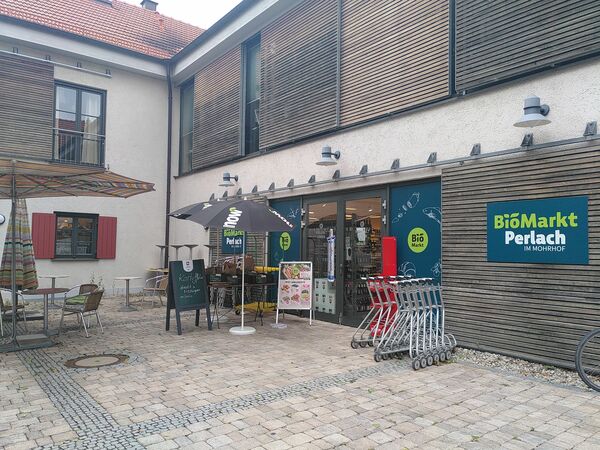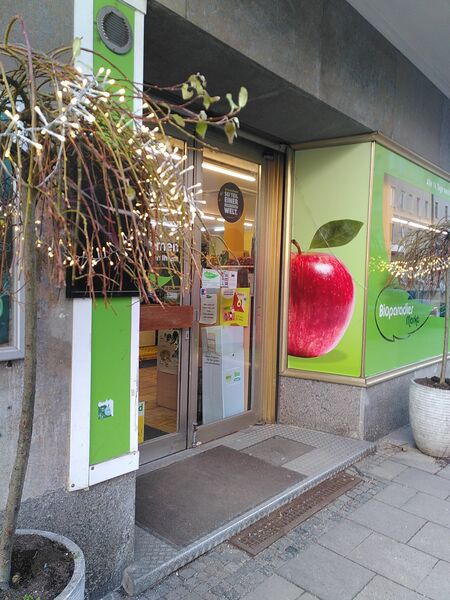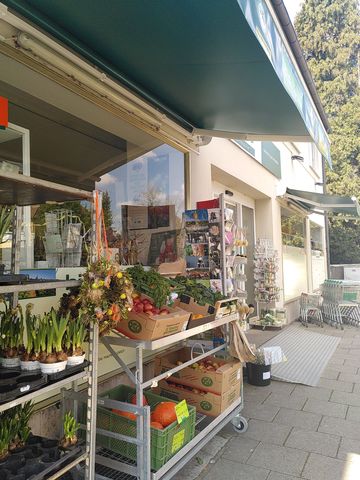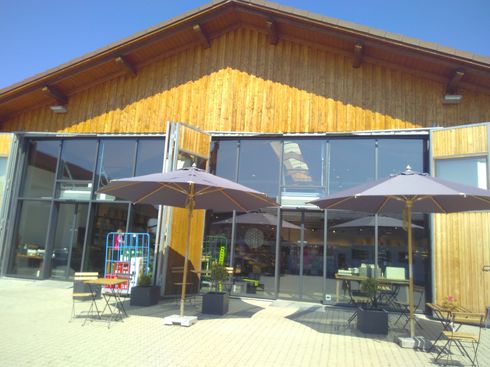Munich: Organic supermarkets
Organic supermarkets can be found on almost every second street corner in Munich but density varies from neighbourhood to neighbourhood.
- Supermarket chains
- Independent full-retailers
- Zero-waste supermarkets
- Co-operatives with membership schemes
- Sunday-open groceries
Organic supermarket chains
In addition to a local organic supermarket chain, Vollcorner (consisting of about twenty markets in Munich and around), Munich hosts several branches of Germany's biggest organic chains Alnatura and Denns (both with more than 10 markets each within the city boundaries). The decline of the Basic chain (see below) which formerly dominated the city centre lead to the opening of a new centrally located Denns supermarket on the premises of a former Lidl branch in May, 2024 (the first Denns supermarket in the city centre did not survive tucked away in the basement of a mall).
Until mid of 2023 Munich was the home of the Basic supermarket chain with 11 markets – early in 2021 this chain restricted its activities to South Germany and Austria and sold all other nation-wide branches. However, these measures did not stop the decline of the company due to management failures, resulting in an insolvency. The Munich shops were taken over by the conventional supermarket chain teGut. Under the new management only the original Basic shop near Isartor and a second one near Nordbad are surviving as organic supermarkets, at least until the end of 2024. After this grace period the company plans to evaluate whether 100 percent organic supermarkets will be part of their concept.
TeGut was not the first conventional full retailer experimenting with fully organic supermarkets: With the Naturkind supermarket in Harlaching the Edeka co-operative is also running an experimental organic supermarkt in Munich, their first and only in town.
With Basic on the verge, there are two regional full retail chains left in town: Landmann's with branches in several Bavarian towns, but only one within the Munich city boundaries, and Vollcorner which does not have branches outside the Munich S-Bahn network. In addition you'll still find many small independent supermarkets, often using a Biomarkt sign, and even some homely, surviving corner shops.
Vollcorner has been making notable efforts to support zero-waste shopping for a long time, and burried many of them due to low customer acceptance. Shopping here you can however be sure not to (indirectly) support huge, globally operating multinational concerns as Vollcorner consistently delists organic brands sold to such companies. So you will find neither Logocos brands (Logona, Lenz, Sante, Heliotrop, Fitne) anymore since the company was bought by L'Oreal (which is partially owned by Nestle), nor Pukka tea (Unilever). Wine-lovers may also collect the corks made from natural cork and return them for recycling at any Vollcorner shop.
On weekdays most organic supermarkets keep open between 9 am and 8 pm, Vollcorner markets open at 8 am. Saturday opening hours vary, the big retailers and Vollcorner close at 8 pm. All groceries except the Biokultur supermarket in the basement of the central train station are closed on Sundays.
Apart from these full range retailers there is a small local food only chain, not offering any toiletries or detergents: Herrmannsdorfer specialises in meat products, bakery items and beer produced in the Herrmannsdorfer Landwerkstätten in Glonn, somewhat outside Munich. The shops close quite early, but if you come during daytime they stock sufficient dry food, dairy products, fruits, veges, sweets and more to spare you the trip to a second shop. Unlike the Basic chain Herrmannsdorfer allows you to buy meat in your own containers.
In 2015 a branch of the hyped Italian Eataly delicatessen chain opened within the architectonically interesting glass and iron construction of Schrannenhalle near Viktualienmarkt. It's true, they offer a good range of organic products, and organic food items are labelled as such on the shelves, but it's nevertheless a disappointing experience: Almost no fresh organic fruit and veges (not even the fresh herbs are organic), only pre-packaged organic meat (forget about the well-assorted meat counter), and the organic wines and spirits in the basement are not marked "bio" on the shelves, so it's very hard to find them.
Independent full-retailers
If you want to support the local economy, both Vollcorner and Herrmannsdorfer shops are all fine, but you may prefer to support independent markets where the owners are actually running the stores and create a homely and personal atmosphere. Often you will find products not on sale by the big chains.

When traditional Grüner Markt chain closed down end of September 2014, their main house in the Altperlach neighbourhood made an exception. Housed in a vault it has a pleasant italophilic, somewhat venerable atmosphere, definitely worth a visit. The perfect surroundings when shopping for delicatessen, and a must-go during the Christmas season. It's now dubbed Mohrhof Perlach.
The other big independent is Schmatz ("smack") in the Glockenbach neighbourhood. Step by if only for the lovely decoration of their bodycare section. Kids are invited to play in an old-fashioned corner shop, and selected items are lovingly set on display. It's the only organic supermarket playing music in the background. By the end of 2018 they issued a ban on fresh herbs in plastics packing, and in 2022 there's a dedicated unpackaged shelf with dry food in deposit glasses.
For the picturesque yet upmarket farmshop feeling in the city aim for Stemmerhof on top of the Sendlinger Berg. Once upon a time a wealthy village farm opposite the village church the nicely restored houses are now the home of an organic supermarket and a range of small owner-run shops. The supermarket's butcher's cum delicatessen disk will happily sell lunch snacks to eat on the spot or to take-away. The same enterprise also runs a second branch in the suburb of Grünwald, just a street crossing opposite of Alter Wirt hotel and restaurant.

In the posh Lehel neighbourhood near the Eisbach river within the Englischer Garten park you'll find an independent organic supermarket with a touch of a spice and greens bazaar, the Bioparadies Biomarkt. Its friendly staff was even willing to open after closing time, to sell me a left-over bread on a Saturday afternoon. The serviced bakery and cheese counter is also the place to refill your spice jars with loose-weight herbs and spices. The supermarket is conveniently located opposite the tram stop "Paradiesstraße".
The former Erdgarten supermarket a ten-minutes walk away from Pasing train station (or two minutes from Pasing Marienplatz square) reopened as a branch of the local Vollcorner chain September, 2019 and continues to serve organic and vegetarian wholefood lunch as well as coffee and cake. They also have a nicely decorated bodycare section. Whether they'll continue to serve knitters with a fine selection of organic wool I am not aware of.

If you by chance happen to strand near the Klinikum Harlaching hospital, don't dispair: two tramstops in North-Eastern direction on the left side (just follow the tram line along Grünwalder Str.) you'll find Biowelt, a crammed independent organic supermarket with a superb selection of both, bodycare and frozen convenience products: All you need if visiting a friend or relative in the hospital in urgent need of a proper meal. Starting with lunch time they offer a helping of organic soup and a small selection of snacks. You may ask for a sandwich made on the spot. The shop also has a zero waste corner with dispensers for legumes and a small selection of other dry food as well as an assortment of dried fruit. Make sure to step by check-out to weigh your containers before you fill them.
Attending a conference at one of the huge Bogenhausen hotels near Effnerplatz? Your lunch break should be sufficient to follow Bülowstraße in Western direction to Herkomerplatz. Here you'll find not only a Herrmannsdorfer butcher's shop cum grocery cum eatery and the Hofpfisterei bakery branch next to it, but also a pleasant family-owned organic supermarket dubbed Biovolet. The Riemensberger family placed some bar tables in the entrance area to have a snack, and there is a second branch in Eching (formerly a Grüner Markt branch). Pay with your EC (VPay) debit card, and they donate a few cent to the BioBoden co-operative which buys farm land in order to lease it to organic farmers. On Thursdays you will receive a 10 percent discount if your shopping cart is worth more than 50 euros.
In the neighbourhood of Schwabing one of the oldest organic groceries in town is located, these days rather boringly dubbed Echt Bio Markt which is the brand of a network of small-scale independent organic supermarkets. The pleasant, traditional shop in Tengstraße offers refill for organic household detergents.
However. not all supermarkets of this brand have been long established: The independent owner-run Echt Bio Markt in Nymphenburg was opened during the lock-down of the covid-19 pandemic: As its name suggests Bio am Romanplatz is the perfect place to shop for provisions at the tram hub at Romanplatz.
There's only one Sunday-open organic supermarket in Munich, the Biokultur in the basement of the main train station. It's sister branch in the newly developed neighbourhood of Riem on the plot of the former Munich airport can be found inside the Riem Arcaden shopping mall, sporting the only organic cafe in the neighbourhood. Unfortunately neither the cafe nor the supermarket are open on Sundays or public holidays.

If you happen to take the S7 urban train in southern direction to the municipality of Höhenkirchen-Siegertsbrunn take the time to visit Roberts Bio-Genussmarkt on the premises of a former farmyard. The spacious, pleasantly refurbished and nicely decorated barn with its dark wooden shelfs makes it easy to spend some time on a coffee and cake in the included cafe area. When the weather is nice sun-shaded outdoor seating is provided. The former village of Höhenkirchen is part of the Mangfall bicycle route from Munich to Rosenheim, and this is a pleasant place for a break.
Waste-free supermarkets
By 2016 the first wrapping free supermarket made it into town: Check the zero-waste post for reviews.
Co-operatives with membership schemes
In the 1970ies and 1980ies many organic neighbourhood shops in Western Germany were co-operatively organised and sold to members only. In the 1990ies most of the surviving shops like the "Abakus" in Bremen opened to the general public, with discount schemes for members. To my knowledge, there's no such surviving shop in Munich, but recently established co-operatives such as "Deine Alternative" in Zorneding continue this inclusive approach.
As community supported agriculture (CSA) has an increasing appeal to city dwellers (the biggest one in Munich is the Kartoffelkombinat), the concept of an organic supermarket for members only came back to town in 2016, with the Ökoesel ("eco donkey"), by now a small, yet full-fledged organic supermarket in Nymphenburg near Leonrodplatz, focussing on package-free food.
When the founders of Munich's oldest organic supermarket, Lebascha in Haidhausen, were to pass over the shop to a younger generation in summer 2022, the Ökoesel folks stepped in. Although both branches focus on a membership scheme, they are neighbourhood groceries open to everyone. As a non-member you'll simply pay non-subsidised (i.e. higher) prices.
In summer 2021, another approach followed with the establishment of the Foodhub co-operative in Giesing, next to the lovely cafe "Shotgun Sister" and an organic bakery shop.
If you live in the vicinity you may consider joining this special organic food co-op which runs on the principle of solidarity: every member works three hours per month for or in the project and what's sold in the supermarket (predominantly regional produce) is decided democratically by its members. The shop concentrates on pre-packaged food, household and toiletry items, with the exception of loose weight fruits and veges, a small number of dry food gravity bins offering grains and nuts, and the self-service bread and rolls section. The household cleaning and bodycare shelves are filled with products in environmentally friendly packaging and focus on re-use (like the bamboo paper kitchen paper which can be washed and thus used several times) or little packaging through bigger volumes. There are plans for a zero-waste station to refill cleaning agents.
When I visited the shop at their open day in autumn 2021 I was surprised to not find a serviced fresh food counter given the fact that Karl Schweisfurt of Herrmannsdorfer Landwerkstätten is one of the three legal heads of the co-operative, most likely due to the fact that such a counter needs to be staffed.
No membership fee is required for becoming a member of the on-line market platform Marktschwärmer. There's a Marktschwärmerei pick-up hub in the neighbourhood of Milbertshofen. If you decide to join, you can order food, beverages, sweets and more from predominantly organic producers in and around Munich.
Formerly organic supermarkets
As part of the "teGut" chain the following, former "Basic" supermarkets still offer a reduced assortment of organic products:
- teGut Bogenhausen, Richard-Strauss-Str. 48, Mon–Sat 8–20
- teGut Neuhausen, Nymphenburger Str. 82, Mon–Sat 8–20
- teGut Laim, Agnes-Bernauer-Str. 73, Mon–Sat 8–20
- teGut Altstadt, Müllerstr. 45, Mon–Sat 7–20
- teGut Neuperlach, Thomas-Dehler-Str. 45, Mon–Sat 7–20
- teGut Ludwigsvorstadt, Luitpoldstr. 3, Mon–Sat 7–20
- teGut Schwabing, Belgradstr. 59, Mon–Sat 7–20
- teGut Victoriaviertel, Rheinstr. 1, Mon–Sat 8–20
Closed down
The following organic supermarkets do no longer exist although you will still find references to them on the web:
- Alnatura Innenstadt, Sonnenstr. 23
- Alnatura Aschheim, Theodor-Fontane-Str. 10, Aschheim
- Biochicco, Ohlmüllerstr. 19 corner Zeppelinstr.
- Biomarkt CM, Schlüsselbergstr. 13 (Berg am Laim)
- Denns w/in Hofstatt mall, Sendlinger Str. 12a, basement (city centre)
- Die Bio-Bäuerin, Peter-Wolfram-Str. 31 (Gronsdorf)
- Entenbach Naturkost, Schlotthauerstr. 16
- Johannisgarten Naturkost, Johannisplatz 21 (Haidhausen)
- Gut zum Leben, Motorama Ladenstadt, Rosenheimer Str. 30-32 (Haidhausen)
- Tagwerk-Bioladen Hofgut Riem, Isarlandstr. 1 (Riem)
- Marktschwärmerei Werksviertel, c/o Cafe Guatemuc, Atelierstr. 1
- Nicos Naturkost, Kazmairstr. 38
- Veganz, Baldestr. 21 corner Auenstr., including self-service cafe Goodies
- Radix, Thalkirchner Str. 88 (Isarvorstadt)
- Vollcorner Ludwigsvorstadt, Lindwurmstr. 80
2025-01-22 14:00:00 [Munich, Au, Bogenhausen, Haidhausen, Harlaching, Lehel, Maxvorstadt, Nymphenburg, Schwabing, Pasing, Aschheim, Hoehenkirchen-Siegertsbrunn, Englischer_Garten, Mangfallradweg, Mangfall_cycle_route, organic, supermarkets, grocery, lunch, snacks, deli, Italian, CSA] [direct link · table of contents]









